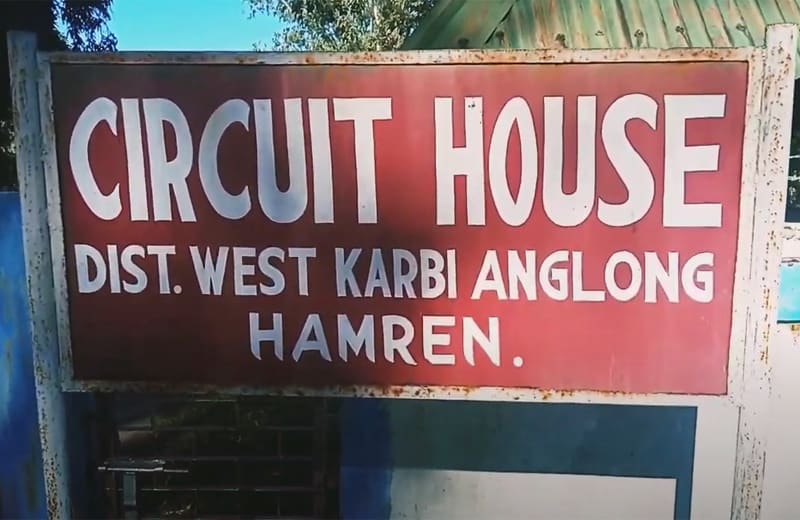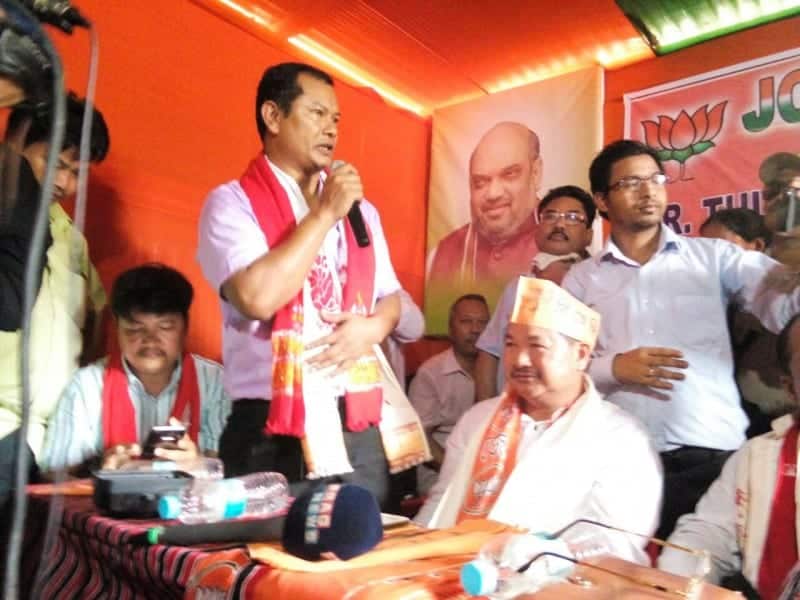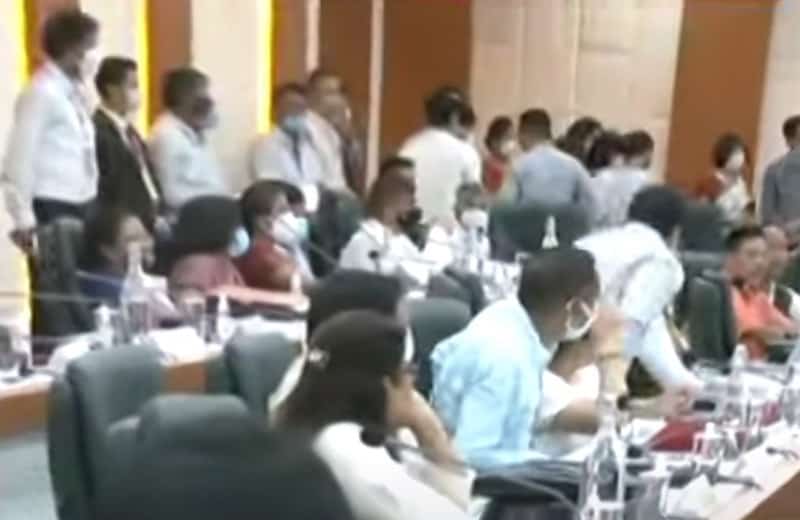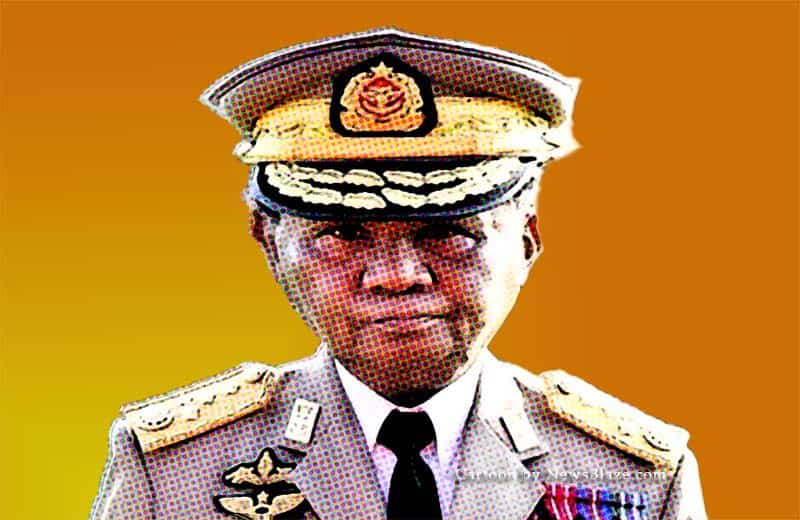Bangladesh embraces 12th its general elections since its birth as a nation in 1971, on Sunday. It is a working day in the Muslim majority country, amidst violence and uncertainties as the prime opposition party has boycotted the polls. Bangladesh Nationalist Party (BNP) also called for a 48-hour Hartal (general strike) beginning from 6 am on 6 January till 6 am on 8 January alleging that the election under the incumbent Awami League (AL) government led by Prime Minister Sheikh Hasina will never be free and fair.
Jamaat-e-Islami, a radical party of Bangladesh, took out processions in the capital city of Dhaka in support of the Hartal, apprehending turmoil on polling day. After BNP’s absence only a compromised opposition Jatiya Party remains in the fray. The rest (nearly 25 political parties putting their candidates) are mostly allies to the ruling party. So understandably PM Hasina is winning for the fourth consecutive term to lead the poverty stricken south Asian nation, strategically located between India and Myanmar.
Bangladesh Polling Day
The polling of votes begins at 8 in the morning (Bangladesh is ahead of India by 30 minutes) where 120 million registered voters will exercise their franchise to elect 299 representatives for the Jatiya Sansad (election in one constituency was postponed due to the death of an independent candidate). More than 1500 candidates representing over 27 political parties are contesting the national election, whose fates will be decided by the voters through over 42,000 polling stations across the country. Polling continues until four in the afternoon and counting of ballots to start subsequently making the results out by Monday morning.
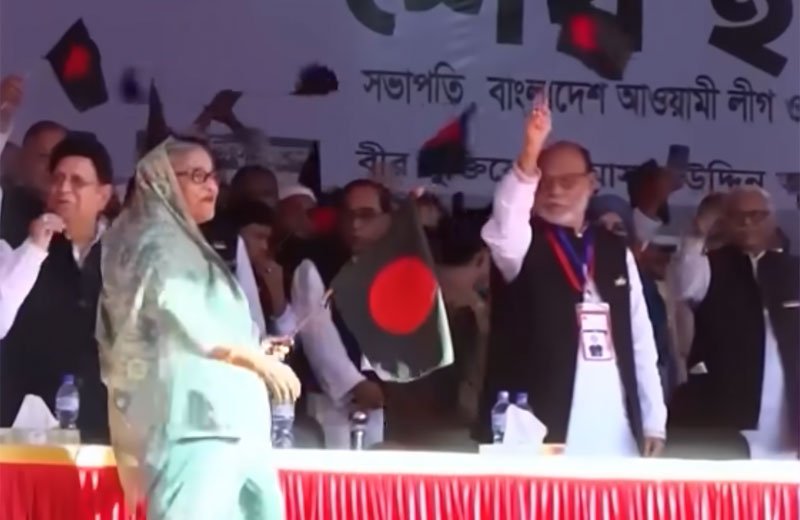
Sheik Hasina, Bangladesh PM, youtube screenshot.
Hasina Votes First
Meanwhile PM Hasina, accompanied by her sister Sheikh Rehana and daughter Saima Wazed, exercised her franchise as the first voter in Dhaka City College polling station and expressed confidence to win the polls. Over 750,000 police and paramilitary forces have been deployed on the ground, where Bangladesh Army, Navy, and Air Force personnel will also be on duty to ensure security for 170 million Bangladeshi nationals during the polls.
150 Foreign Observers
More than 150 foreign observers representing over 30 countries and organisations like the Commonwealth, European Union, US-based International Republican Institute, South Asia Democratic Forum, National Democratic Institute, etc arrived in Dhaka to monitor the election. Three senior members of the Election Commission of India also joined the mission.
Election Commissioner
Bangladesh chief election commissioner Kazi Habibul Awal assured that the election will be conducted in a free, fair and neutral manner. Each and every Bangladeshi voter can go to the polling centre to exercise their franchises, stated Awal adding that the Bangladesh polls should be observed by national as well as international agencies. Even though the main opposition party (BNP) is not in the fray, it should not be a major challenge to the election commission, he added. Any obstruction of the electoral processes will not be tolerated, the election commission asserted.
Violent Pre-poll Incidents
However, the prelude to the polls witnessed a series of violent incidents in the country. The burning of Benapole Express’s four coaches on Friday night by the miscreants resulted in the death of five passengers including two children and injuries to many others. The incident took place in Gopibagh area as the train was moving towards Kamlapur railway station in Dhaka. Next morning, a polling station (under Bandar police station) and a vehicle were set ablaze in Chittagong locality. PM Hasina expressed shock over the casualties and prayed for an early recovery to all injured persons.
Maintaining its demand to conduct the polls under a neutral and caretaker government, which Hasina denied, the BNP and its political allies organised a number of political rallies in the country. But the mass rally on 28 October turned violent, where at least four people were killed and nearly 300 vehicles torched on the streets. The government in Dhaka started a massive crackdown and put thousands of BNP leaders (including its secretary general Mirza Fakhrul Islam Alamgir) and workers behind bars.
BNP Arrested, Exiled
BNP’s president Khaleda Zia (78) is ailing and with more to it the former Bangla Prime Minister is under house arrest for graft charges. Even the party’s acting president Tarique Rahman has been living in self-imposed exile since 2008. The son of former Bangla President Ziaur Rahman and Zia, even faced an 18 month jail term before leaving for London and staying there till date. So the party has been termed a leaderless entity on the ground and they are assumed not to be in a position to contest the elections.
Speaking to this writer from Dhaka, political analyst Abdul Kalam revealed that this is really an opposition-less election as even Jatiya Party received favours from the ruling AL. Initially, Jatiya Party was also planning to boycott the election along with the BNP and its allies. Soon the ruling party vacated 26 seats for it, withdrawing the nominees to get the only opposition party in the fray. The ruling AL fielded candidates in 263 constituencies and offered six seats to its political allies under Mahajoat.
Hasina’s party also encouraged more AL leaders to file nominations so that the election can be shown as a participatory one. Among 400 independent candidates, one can find many AL leaders as dummies, Kalam asserted.
Hasina (76) won the parliamentary elections in 2008, 2014, and 2019 to already emerge as the longest-serving government head among women in the world. Daughter of Bangabandhu Sheikh Mujibur Rahman, Hasina urged Bangladeshi voters to exercise their franchises in more numbers. She claimed that only AL can lead the country to prosperity and growth. In the election manifesto, Hasina promised to convert the digital Bangladesh to a Smart Bangladesh. She also assured that her party will always protect and promote the spirit of democracy, offer quality education to youths, modernise agriculture, make healthcare services affordable to all, and more.
Violence Against Journalists
The Paris-based Reporters Without Borders (RSF) expressed its concern over the safety of journalists in Bangladeshi going for polls on 7 January. In recent months, attacks against journalists have multiplied, fostering a climate of terror favourable to the regime in power, some have been murdered, others imprisoned and dozens of reporters brutalised while reporting, said the RSF, adding that by almost systematically censoring all critical information, turning a blind eye to violence against journalists and making abundant use of propaganda, it is confirming that it has lost all credibility when it comes to democracy.
“The government is preparing for a tense election, with the army deployed since 3 January for a period of at least a week to ensure, according to the authorities, that the elections are ‘free, fair, impartial and peaceful’. The main opposition party BNP – 20,000 of whose activists have been arrested and 88,000 others are facing legal action – decided to boycott the event in view of what it considers to be another electoral sham,” said the media rights body, adding that the current government is ending its term of office as it began five years ago.
Press Predator
Since its controversial victory in the last elections, the Hasina government has paid no heed to the repeated warnings of numerous press freedom organisations and associations. She was listed by the RSF as one of the 37 press freedom predators in 2021. Last year, three journalists were murdered with total impunity and six media professionals are still in prison in the country, while dozens of others have been the victims of violence, particularly after publishing articles on government corruption or certain local potentates, asserted the RSF. It added that in recent months, election candidates, militias and student wings of the ruling party, as well as radical religious groups, also stepped up their attacks on journalists, while the government looks on.
Journalists Attacked By Demonstrators
During an opposition demonstration that degenerated on 28 October, around thirty journalists were attacked by demonstrators, both opponents and supporters of the government, as well as by the police. Another major threat to journalists is online censorship in Bangladesh. Last September, the Bangladeshi authorities adopted a new cybersecurity law (CSA) that makes it possible to prosecute journalists and bloggers who criticise the government online. RSF even fears that communication networks will be cut off, as the government did during the previous elections at the end of 2018.

